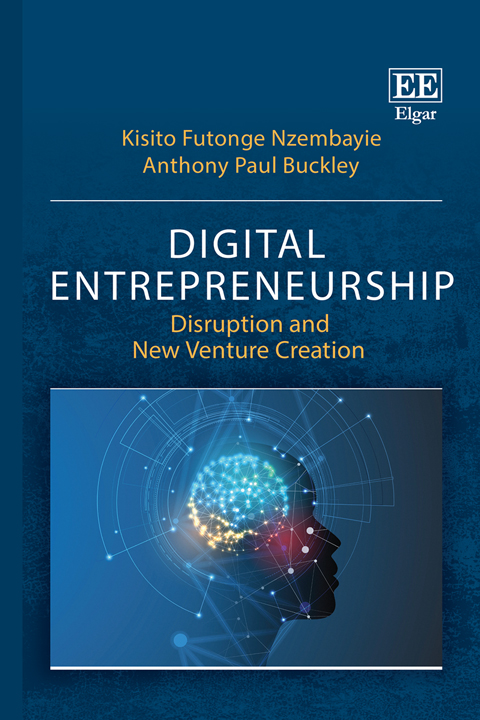Digital Entrepreneurship
Disruption and New Venture Creation
Recognizing how the lines between digital and traditional forms of entrepreneurship are blurring, this forward-thinking book combines digital technology and entrepreneurship perspectives to advance knowledge on this paradigm-shifting typology of entrepreneurship.
Also Available on :
Chapter 1 – Abstract
This chapter introduces the context of digital entrepreneurship as a disruptive form of new venture creation in the digital age. It conceptualizes the phenomenon and its distinctive typologies. The typologies are differentiated in relation to traditional entrepreneurship along the lines of digitization and physicality, which are either core or peripheral to new venture ideas and market offerings. Digitized market offerings manifested in digital artifacts and digital platforms are the purview of digital entrepreneurship. When applied across the economy, they have a transformative and disruptive impact on society. The process of creating and applying digital artifacts and digital platforms to the economy has undermined traditional theories of value creation, particularly those rooted in assumptions of spatial and temporal boundedness. Consequently, this book examines how this paradigm-shifting form of entrepreneurship emerges while upending established theoretical and practical assumptions of value creation in the digital age.
Overview & Preview
6 Chapters
224 Pages
Kisito Futonge Nzembayie and Anthony Paul Buckley explore how in the digital age, the micro-level activities of digital entrepreneurs in new venture creation continue to digitally transform and disrupt economic systems at macro-levels. As digital entrepreneurship and other typologies of entrepreneurship in the digital age become increasingly conceptually fuzzy, the book sets out to define the digital entrepreneurship domain; what it is and why it is distinctive and disruptive. It concludes by offering a pragmatic framework for digital entrepreneurship implementation and demonstrates how the authors have put this into practice in their own work.
Placing digital entrepreneurship in its conceptual and historical context, the book provides a clear understanding of the mechanisms driving the digital entrepreneurial process and practical tools to help nurture and develop new digital ventures. It will be valuable reading for business scholars and students interested in the role of technology in their field. Business managers and practitioners will also benefit from the book’s guidelines and analytical tools.
Chapter Abstracts
Chapter 2 – Abstract
In this chapter, the evolution of contemporary entrepreneurship thought is traced while highlighting theoretical developments leading to entrepreneurship scholarship. It illustrates that entrepreneurship theory has co-evolved with economic thought. Currently, the domain revolves around the individual-opportunity nexus, with the pursuit of opportunity being its processual focus. However, the opportunity construct has proven elusive, leading to an impasse. To move beyond the impasse, opportunity has been decoupled into the sub-constructs of new venture ideas and external enablers. Hence, the entrepreneurial process more concretely describes external enabling mechanisms that play an input role in driving agents to initiate new venture ideas and act under uncertainty, leading to various outcomes. Combining the latest thinking in the domain, we develop a comprehensive entrepreneurial process model that functions as an analytical tool. The model provides the starting point for elucidating the similarities and differences between digital and traditional entrepreneurship assumptions in subsequent chapters.
Chapter 3 – Abstract
By integrating relevant interdisciplinary concepts, constructs, and theories, this chapter dissects the extent to which digitization upends several traditional assumptions of innovation and entrepreneurship. By exploiting the concepts of physicality and digitization, it provides a conceptual basis for differentiating while at the same time establishing the relationship between digital entrepreneurship and other forms of entrepreneurship in the digital age. Hence, the chapter examines the three interrelated technologies and their affordances that play varying roles in the digital entrepreneurial process. It explains that digital artifacts and digital platforms form the core of new venture ideas and new market offerings in digital entrepreneurship at its purest. This is both significant and paradigm-shifting as data-driven products and services become the basis of economic value creation. At a micro level, the result is the potential for the rapid, continuous, and dynamic emergence of the digital entrepreneurial process compared to more traditional entrepreneurial processes.
Chapter 4 – Abstract
An unbundling of digital technology change is essential to understand the forces driving digital entrepreneurship and its effects – digital transformation and disruption. Hence, this chapter begins by examining the core internet infrastructure and its layered modular architecture. Consequently, it highlights the changes happening within each layer that cumulatively enable digital entrepreneurship. Additionally, the computing infrastructure is analyzed with a focus on enabling trends in microprocessing capabilities, storage, and miniaturization. Further, the chapter illustrates how disparate technologies are converging to drive the next wave of digital entrepreneurship. Accordingly, cloud computing, AI and machine learning, big data, and IoT are emphasized as four core technologies shaping the future of digital entrepreneurship. Finally, the chapter examines potential barriers that must be addressed to maximize the potential of enabling technology change. Consequently, the reader emerges equipped with an integrative view of the forces shaping value creation in the digital age.
Chapter 5 – Abstract
A process model of practical utility is vital to ensuring that aspiring digital entrepreneurs, policymakers, educators, and students are equipped with a valuable framework for steering digital new venture creation. This chapter addresses such a need by offering an evidence-based pragmatic model of digital new venture creation. The model provides prescriptive guidelines for steering a digital entrepreneurial process, structured in two phases. Phase 1 is the Ideate and Evaluate phase, which offers fine-grained tactics, tools, and techniques for proactively developing digital new venture ideas while assessing them to determine if they form a viable basis for entrepreneurial action. Phase 2 is the Enact and React phase, which equips users with instruments and skills for navigating the tightly interwoven sub-processes of digital product/service innovation and digital growth marketing. By following the recommendations embedded in the model, users increase the odds of arriving at scalable digital new venture outcomes
Chapter 6 – Abstract
This chapter offers a final synopsis of the core tenets of this book as expatiated in previous chapters. Summaries of relevant discussions that help conceptualize and contextualize the subject of this book in the first chapter are revisited. Likewise, critical arguments made in the second chapter are briefly reviewed that offer a general introduction to entrepreneurship theory. It is followed by summaries of the vital third chapter, which delves into the distinctiveness of digital entrepreneurship and its disruptive effects. The fourth chapter is equally summed up, which builds on the third to provide the contextual basis for appreciating the current state of change in the digital technology landscape and its implications. It follows with an encapsulation of the fifth chapter, with its contribution of a digital new venture creation model with practical utility. Ultimately, the reader is reminded of the key contributions made by this book.
Recommended Citation
Nzembayie, K.F., & Buckley, A.P. (2022). Digital Entrepreneurship: Disruption and New Venture Creation. Cheltenham, UK and Northampton, MA, USA: Edward Elgar Publishing.
Get it Now!
Get your copy here to start / give boost to your digital entrepreneurship journey.
Stay tuned
Subscribe to newsletter to stay up to date.


